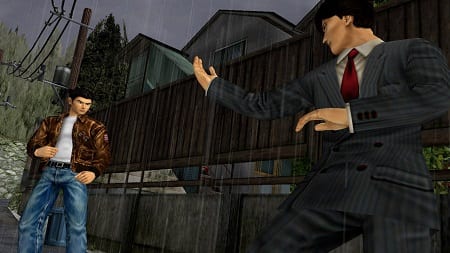Video Game Review: Shenmue I & II

Everybody was, in fact, kung-fu fighting.
It’s hard to overstate the excitement level that surrounded the launch of Shenmue nearly two decades ago as Yu Suzuki‘s magnum opus was unlike anything the gaming world had seen before. The Dreamcast exclusive received a sequel two years later (at least in North America), though this time on the Xbox following the untimely demise of SEGA’s console. Now, modern audiences can experience both games with upgraded high-definition graphics in Shenmue I & II.
CONTROLS (2.5/5)
Nostalgia can be a hell of an equalizer in many respects, but in the same way old Resident Evil games are hard to manage, Shenmue can be an absolute chore to navigate. The tank-style controls return unmolested — sadly there’s no option for an updated scheme — and they can make simple actions like running or interacting with objects an exercise in frustration. Even worse is the camera, which can be moved via the right stick but is constantly trying to reposition itself behind you. It feels positively archaic.
There’s also a fair amount of quick-time events (QTEs) in both games. These haven’t aged all that well, either, and it felt like sometimes directional inputs didn’t read properly, but you should be able to grind through them. Forklift racing, one of the game’s most famous aspects, holds up better, though we found it more difficult than we remember. Perhaps gaming’s modern conveniences have eroded our skills.
GRAPHICS/SOUND (3/5)
If you’re new to Shenmue, it’s important to keep in mind that this is an HD port, not a remake, so you’re experiencing a gussied up version of a nearly 20-year-old title. To that end, the technical aspects of Shenmue are rough with some awkward animations, drab backgrounds and so on — the sequel fares noticeably better on that front with improved clarity.
To focus purely on graphical prowess is unfair, however, as the beauty of Suzuki’s creation lies in how it was created. In many ways it served as the blueprint for modern open-world games, and there’s a lot to admire about it even today. The way NPCs go about daily routines, the ability to enter shops and knock on doors. So many things that have become commonplace were cutting edge when the game released, and it’s a pretty cool walk down memory lane.
While the controls may be the place that Shenmue most shows its age, voice acting is a close second. The delivery is stilted and some of the actual dialogue is painfully awkward, but it’s the shockingly poor quality that really stands out. Everything is muffled, and we flipped on subtitles immediately to ensure we didn’t miss any hints. The game’s orchestral score still holds its own at least, adding weight and emotion to its most important sequences.
GAMEPLAY (4/5)
Set in 1980s Japan, Shenmue casts you as Ryo Hazuki, a young martial artist who witnesses the murder of his father by the mysterious Lan Di over an artifact called the dragon mirror. Vowing revenge, Ryo begins to investigate the events surrounding his father’s death, falling under the tutelage of Master Chen and attempting to follow Lan Di, who has departed Yokosuka for Hong Kong.
Shenmue II picks up upon Ryo’s arrival in Hong Kong where he must locate Yuanda Zhu, who had written a letter of warning to Ryo’s father informing him of the threat of Lan Di. Your hope is to learn more about the mirrors — both the one that was stolen and the one Ryo now has in his possession — and the source of the animosity between Lan Di and your father as well as the former’s intentions for the dragon mirror.
Both stories are solid, though the aforementioned issues with poor sound quality and shaky performances hurt the presentation. Then again, it was the construction of the world that made the games stand out, even more so than the narrative. Things like having NPCs going about daily routines and being able to open every cabinet were unprecedented at the time, and now they offer a glimpse into the early stages of open-world gaming.
To be clear, though, Shenmue I & II are absent most modern conveniences, often making for a very deliberate experience in which you’ll need to have multiple conversations to track down a location only to find it closed or the person you’re supposed to meet gone. It may feel quaint initially, but when the time spent milling about waiting for in-game hours to pass starts to pile up it can become rather taxing.
Combat, the game’s other pillar, has aged more gracefully, which shouldn’t be a huge surprise given Suzuki’s background in the Virtua Fighter series. Ryo begins with a limited skill set to draw upon, but he’ll unlock new moves and techniques by encountering new trainers and acquiring spirit scrolls. It’s rudimentary compared to any number of newer titles, but there’s still an enjoyable simplicity to it.
There’s also a number of secondary activities to be found, including playing classic SEGA arcade games like Space Harrier, Afterburner and Outrun, and collecting capsule toys. So many things found here are considered standard issue now, but at the time it was unheard of, and as such it’s interesting to go back and see those origins.
It’s fair to assume that your age, patience level and whether or not you played the games before (and/or plan to get the upcoming Shenmue III) will greatly affect how you react to Shenmue‘s pacing and style. Even if you loved it when it came out, you may find the reality isn’t quite what you remembered after so many games have built on its foundation.
OVERALL (3.5/5)
Reviewing re-releases is often a balancing act, and nowhere is that more true than with Shenmue I & II. The games did so many innovative things, but there’s no denying the industry has moved the genre forward significantly over the years. Although we enjoyed revisiting Suzuki’s world, mileage will most assuredly vary.







